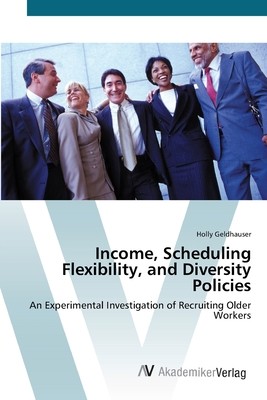
- We will send in 10–14 business days.
- Author: Holly Geldhauser
- Publisher: AV Akademikerverlag
- ISBN-10: 3639399250
- ISBN-13: 9783639399257
- Format: 15.2 x 22.9 x 0.7 cm, minkšti viršeliai
- Language: English
- SAVE -10% with code: EXTRA
Income, Scheduling Flexibility, and Diversity Policies (e-book) (used book) | bookbook.eu
Reviews
Description
Revision with unchanged content. A number of surveys have tapped the interests of older employees as a way to understand the factors that encourage extended employment (Bass, 1995; Sterns, 1998). The current research has two purposes. The first is an applied goal; to determine the organizational factors that are most attractive to older workers seeking employment. The second purpose is to investigate the predictive strength of these variables through a controlled experimental design rather than using survey methodology. We chose to examine the importance of pay, work flexibility, and diversity policies as determinants of interest in the return to work among white collar employees. While pay and flexibility have emerged in past research as factors that influence the interest of older employees, the impact of diversity policies has not been well-researched, so this represents an extension of past research. Two levels of each of these three variables were used in the current study, creating a 2 (pay level) X 2 (flexibility) X 2 (diversity policy) experimental design. Results of the current study suggest that overall interest in the return to work among white-collar retirees is quite modest (M = 2.45, SD = 1.23), and that flexibility emerged as an important factor in determining return to work. An interaction emerged between diversity policy and pay.
EXTRA 10 % discount with code: EXTRA
The promotion ends in 22d.00:42:09
The discount code is valid when purchasing from 10 €. Discounts do not stack.
- Author: Holly Geldhauser
- Publisher: AV Akademikerverlag
- ISBN-10: 3639399250
- ISBN-13: 9783639399257
- Format: 15.2 x 22.9 x 0.7 cm, minkšti viršeliai
- Language: English English
Revision with unchanged content. A number of surveys have tapped the interests of older employees as a way to understand the factors that encourage extended employment (Bass, 1995; Sterns, 1998). The current research has two purposes. The first is an applied goal; to determine the organizational factors that are most attractive to older workers seeking employment. The second purpose is to investigate the predictive strength of these variables through a controlled experimental design rather than using survey methodology. We chose to examine the importance of pay, work flexibility, and diversity policies as determinants of interest in the return to work among white collar employees. While pay and flexibility have emerged in past research as factors that influence the interest of older employees, the impact of diversity policies has not been well-researched, so this represents an extension of past research. Two levels of each of these three variables were used in the current study, creating a 2 (pay level) X 2 (flexibility) X 2 (diversity policy) experimental design. Results of the current study suggest that overall interest in the return to work among white-collar retirees is quite modest (M = 2.45, SD = 1.23), and that flexibility emerged as an important factor in determining return to work. An interaction emerged between diversity policy and pay.


Reviews